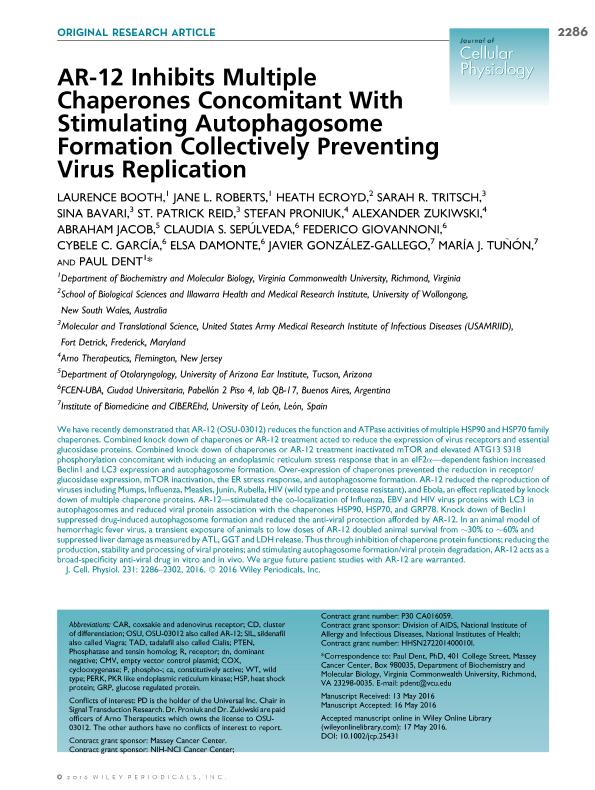Artículo
AR-12 Inhibits Multiple Chaperones Concomitant With Stimulating Autophagosome Formation Collectively Preventing Virus Replication
Booth, Laurence; Roberts, Jane L.; Ecroyd, Heath; Tritsch, Sarah R.; Bavari, Sina; Reid, St. Patrick; Proniuk, Stefan; Zukiwski, Alexander; Jacob, Abraham; Sepúlveda, Claudia Soledad ; Giovannoni, Federico
; Giovannoni, Federico ; Garcia, Cybele
; Garcia, Cybele ; Damonte, Elsa Beatriz
; Damonte, Elsa Beatriz ; González Gallego, Javier; Tuñón, María J.; Dent, Paul
; González Gallego, Javier; Tuñón, María J.; Dent, Paul
 ; Giovannoni, Federico
; Giovannoni, Federico ; Garcia, Cybele
; Garcia, Cybele ; Damonte, Elsa Beatriz
; Damonte, Elsa Beatriz ; González Gallego, Javier; Tuñón, María J.; Dent, Paul
; González Gallego, Javier; Tuñón, María J.; Dent, Paul
Fecha de publicación:
10/2016
Editorial:
Wiley-liss, Div John Wiley & Sons Inc
Revista:
Journal of Cellular Physiology
ISSN:
0021-9541
Idioma:
Inglés
Tipo de recurso:
Artículo publicado
Clasificación temática:
Resumen
We have recently demonstrated that AR-12 (OSU-03012) reduces the function and ATPase activities of multiple HSP90 and HSP70 family chaperones. Combined knock down of chaperones or AR-12 treatment acted to reduce the expression of virus receptors and essential glucosidase proteins. Combined knock down of chaperones or AR-12 treatment inactivated mTOR and elevated ATG13 S318 phosphorylation concomitant with inducing an endoplasmic reticulum stress response that in an eIF2α—dependent fashion increased Beclin1 and LC3 expression and autophagosome formation. Over-expression of chaperones prevented the reduction in receptor/glucosidase expression, mTOR inactivation, the ER stress response, and autophagosome formation. AR-12 reduced the reproduction of viruses including Mumps, Influenza, Measles, Junín, Rubella, HIV (wild type and protease resistant), and Ebola, an effect replicated by knock down of multiple chaperone proteins. AR-12—stimulated the co-localization of Influenza, EBV and HIV virus proteins with LC3 in autophagosomes and reduced viral protein association with the chaperones HSP90, HSP70, and GRP78. Knock down of Beclin1 suppressed drug-induced autophagosome formation and reduced the anti-viral protection afforded by AR-12. In an animal model of hemorrhagic fever virus, a transient exposure of animals to low doses of AR-12 doubled animal survival from ∼30% to ∼60% and suppressed liver damage as measured by ATL, GGT and LDH release. Thus through inhibition of chaperone protein functions; reducing the production, stability and processing of viral proteins; and stimulating autophagosome formation/viral protein degradation, AR-12 acts as a broad-specificity anti-viral drug in vitro and in vivo. We argue future patient studies with AR-12 are warranted. J. Cell. Physiol. 231: 2286–2302, 2016. © 2016 Wiley Periodicals, Inc.
Palabras clave:
Chaperones
,
Antiviral
,
Ar-12
,
Autophagosomes
Archivos asociados
Licencia
Identificadores
Colecciones
Articulos(IQUIBICEN)
Articulos de INSTITUTO DE QUIMICA BIOLOGICA DE LA FACULTAD DE CS. EXACTAS Y NATURALES
Articulos de INSTITUTO DE QUIMICA BIOLOGICA DE LA FACULTAD DE CS. EXACTAS Y NATURALES
Citación
Booth, Laurence; Roberts, Jane L.; Ecroyd, Heath; Tritsch, Sarah R.; Bavari, Sina; et al.; AR-12 Inhibits Multiple Chaperones Concomitant With Stimulating Autophagosome Formation Collectively Preventing Virus Replication; Wiley-liss, Div John Wiley & Sons Inc; Journal of Cellular Physiology; 231; 10; 10-2016; 2286-2302
Compartir
Altmétricas



